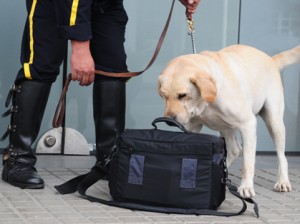AKC Reunite And The Theriogenology Foundation Join Forces to Solve US Detection Dog Shortage
 New York, NY— The need for explosive detection dogs and assistance dogs has never been greater. Unfortunately, only half of the dogs being trained for this work succeed.
New York, NY— The need for explosive detection dogs and assistance dogs has never been greater. Unfortunately, only half of the dogs being trained for this work succeed.
The Working Dog Project is a unique opportunity to apply cutting edge genomics technology to investigate how genetic variation influences behavioral characteristics. By identifying the key genetic factors, breeders can strategically select better working dogs, thereby saving time, energy and dollars. Rarely has there been the opportunity to make such an impact for BOTH our national security and our disabled Americans.
AKC Reunite, the largest non-profit pet identification and recovery service provider in the United States, is donating $150,000 to a joint project with the Theriogenology Foundation to sponsor research at the Broad Institute of MIT and Harvard for The Working Dog Project. The Theriogenology Foundation has made an initial donation of $200,000 to fund the project.
The lack of supply of working dogs has become a pressing issue for the government and has a direct impact on national security. The demand for highly skilled animals is only growing and their availability is limited. Despite decades of pedigree analysis and focused breeding programs, the training success rate for service and working dogs hovers at approximately 50%; for high-performing scent dogs, success rates are even lower. This leads to significant issues including wasted training dollars, puppies pushed into roles in which they cannot succeed, unmet client needs, and, in the military, dogs that cannot fulfill the elite requirements to protect and serve.
“Working dogs are important partners to law enforcement, search and rescue, customs and border patrol, and our military. The incredible scenting ability of dogs makes them essential to explosive detection,” said Alan Kalter, Chairman of AKC Reunite. “We are proud to join with the Theriogenology Foundation in supporting the work being done by the Broad Institute. This research will help breeders understand the genetics needed to produce working dogs that will be on the front lines.”
Genetic tests focused on behavior or temperament would help solve the central challenge: accurate prediction at an early age of potential for successful training. They could help identify which dogs should be trained for particular jobs, and would support more successful breeding programs.
“AKC Reunite and veterinarians have long recognized the value of purpose-bred dogs as canine working partners that make our lives safer and more secure,” added Dr. Anita Migday, President of the Theriogenology Foundation. “With this collaborative effort, we continue to merge science and breeding practices to produce world class working dog teams”.
The Working Dog Project is part of a comprehensive program that engages working dog organizations, scientists and dog breeders. The project will focus on two key working dog behaviors: scenting and retrieving, and will be the first step in leveraging the power of genomics to accelerate the breeding and training of successful working dogs.
“For years we have been diligently committed to supporting research aimed to unlock the genetic code of many physical diseases,” noted Dr. Elinor Karlsson, principal investigator for The Working Dog Project. “Our current commitment is to examine the canine genome as critically for predicting behavior as we have for predicting disease.”
For detailed information regarding the Working Dog Project, please visit www.workingdogproject.org.
Short URL: http://caninechronicle.com/?p=135638
Comments are closed











